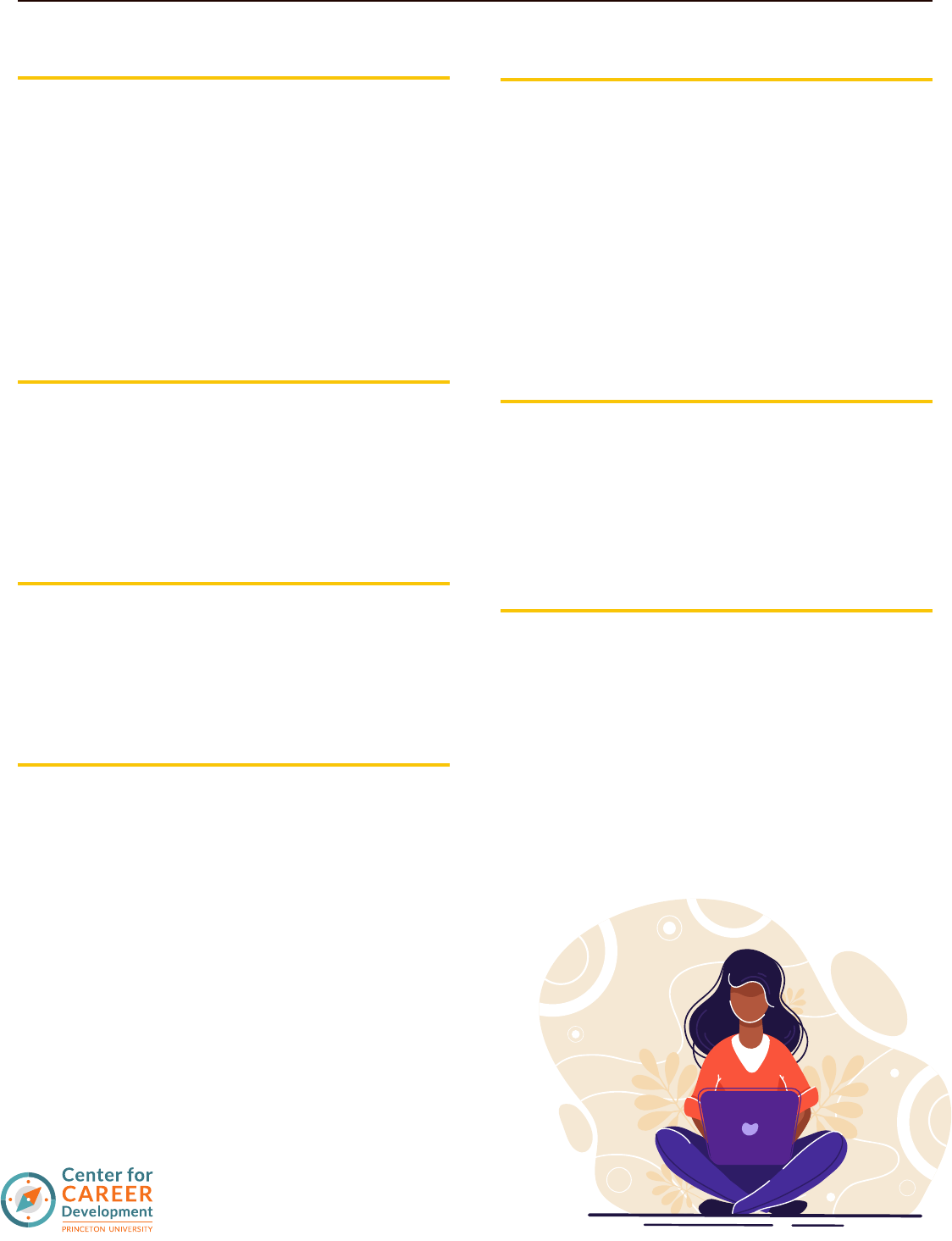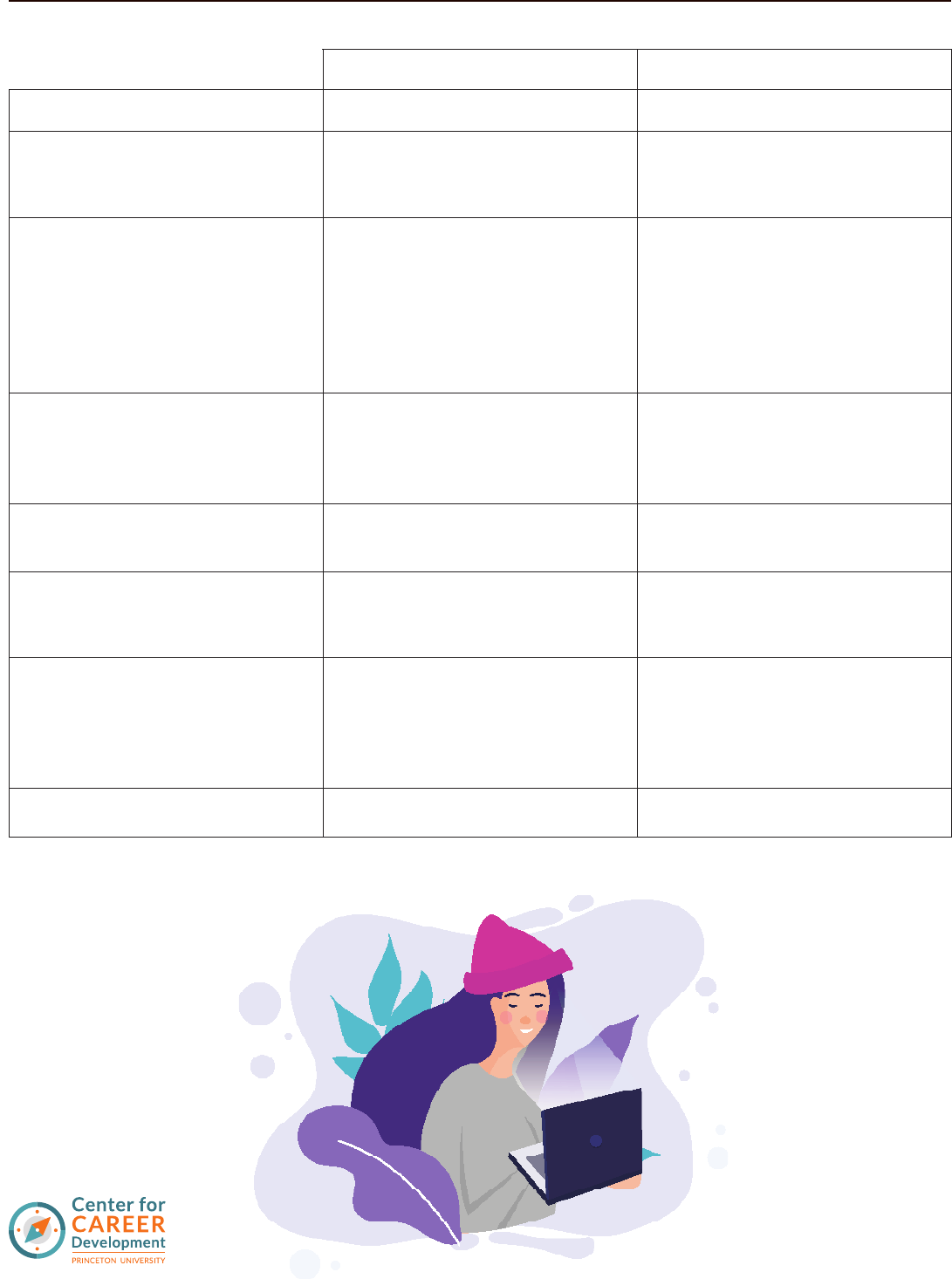
When should I use a CV?
• For academic jobs, a CV allows people in your eld
to understand and appreciate the specics of your
research and your accomplishments.
• If you’re applying for a non-academic job where
people doing the hiring will have a background
similar to your own — such as a research institute
or a research position in industry — then your
academic CV is likely ne to use.
• Your CV should highlight all of your academic
experiences and accomplishments, but be sure to
explore your specic discipline’s preferred format as
they can differ.
When should I use a resume?
• If you’re applying for positions in industry for which
a Ph.D. isn’t necessarily required, then you’ll likely
want to use a resume. For most non-research-
oriented, non-academic jobs, you will want to use a
resume that is one or two pages. Recruiters typically
do not have time to read a CV.
What is an appropriate format for a resume?
• If you are a doctoral candidate applying for jobs
that require a Ph.D. — or if you are being recruited
because of your Ph.D. — then a two-page resume
is ne. However, if you will be applying for positions
in consulting, nance or technology, a one-page
resume is recommended.
• Stick to a common font like Arial, Cambria or Calibri.
Font size should be between 10- and 12-point, and
kept consistent throughout the document. There are
many formats you may use, but it is important to be
comfortable with your nal document.
What is the difference?
• CV is Latin for Curriculum Vitae (course of life). In
the U.S., a C.V is an exhaustive academic summary
used for applications for roles in academia, scientic
research and medical elds. In Europe, Ireland and
New Zealand, the term CV is used to mean the same
as a “resume” in the U.S.
• Resume is derived from the French word résumé,
meaning summary. It’s a formal document that
expresses an individual’s career background,
achievements and skills using a chronological,
functional or combined format.
What are the hallmark characteristics of a CV?
• CV is a detailed description of all the academic
activities and accomplishments you have
accumulated during doctoral study, and includes
extensive information about academic experience,
including degrees, teaching experience, research,
awards/honors, professional associations/licenses,
publications, presentations and other achievements.
What are the hallmark characteristics of a resume?
• A resume is a strategic, targeted and concise
overview of the most relevant skills, achievements
and experiences that relate to the particular career
or position to which you’re applying.
What are some differentiating factors between
a CV and a resume?
• A resume is typically shorter — one-to-two pages at
most — and will dedicate more space to your work
and research experience. It focuses less on academic
awards, conference presentations and publications.
• Depending on your intended reader, your resume
will likely go into less detail on the specics of your
research, presentations, publications and teaching
topics. Instead, it will highlight the transferable and
relevant skills you developed through this work.
CV vs. Resume Guide

CV vs. Resume Breakdown
Academic CV Resume
Audience Academics Recruiters and hiring managers
Target Organizations CVs are used in academic and in
research-oriented job searches
Resumes are used for business,
nonprot, government and other
private industry positions
Goal Present a full history of your
academic credentials - research,
teaching, publications, honors/
awards, and service
Prove through action-oriented
accomplishment statements and
metrics that you can do the job well
and possess experience that shows
your background/experience is
well-aligned with the position(s) of
interest
Focus Academic achievements and scholarly
accomplishments
Skills and accomplishments that
can be used in business, nonprot,
government and other types of job
searches
Length Flexible One or two pages is preferred
depending on industry
Publications Include all publications If relevant to the work that you’re
applying to do, include selected
publications
Honors/Awards/Afliations Include all academic honors/awards
and afliations
Consider minimizing, deleting or
incorporating this section into the
education section of your resume
to allow for space to focus on
transferable skills
References Always include Do not include
